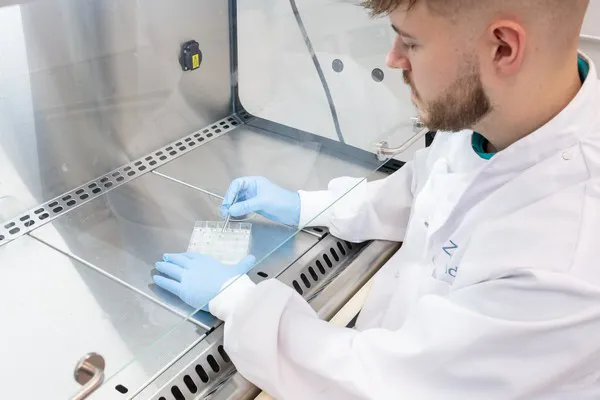Growers hit by energy increases could increase productivity with a novel seed treatment. Results from Zayndu show yield increases of 10 – 27% in the yield of herb and salad crops and more rapid germination following treatment with its Aurora plasma-tech.
Improving productivity could offer a significant impact on the sector, according to Bernhard Strauss, Director of Research and Operations, at consultancy firm Camrose. He has just completed an analysis of the energy requirements of the controlled environment horticulture sector for Defra in collaboration with the Institute for Manufacturing, University of Cambridge.
He comments that recent research* shows plantings are being scaled back by up to 20% this year, with many growers walking away from contracts and considering withdrawing from the sector. Autumn and winter planting in heated glasshouses will be reduced due to energy costs.

Strauss says: “The pressure on growers is only likely to accelerate, especially in the high-tech glasshouse sector, as energy costs remain staggeringly high. Even more so in Vertical Farming, where typical electricity inputs per year are ~300kWh/m2 for HVAC, dehumidification systems, pumps, etc., plus ~700kWh/m2 for lighting; so with energy costs increasing by 156%, commercial viability is a real issue.
“Hence, a possible yield increase in the range of 15% without additional inputs would be of great interest to the VF sector and for different types of glasshouse and polythene tunnel growing. Achieving consistent yield increases at this level by another method would need an increase in material inputs or labor.”
Although leafy greens, such as lettuce, as well as herb crops, such as basil, cress, chive, parsley, dill, and coriander, are currently grown to a large extent in different types of low-tech greenhouses and polythene tunnels, they are particularly suitable for the VF sector. With larger VF operators able to grow as many as 15-20 ‘harvests’ per year through tightly staggered planting cycles over an area footprint of less than half a hectare.
The Zayndu Aurora System uses low-energy plasma technology to treat the seeds in small batches prior to planting. The treatment takes minutes to complete and produces no waste – just clean air and seeds.
In trials, it has been found that the yield increases on average: Chive 10%, Parsley 10%, Coriander 15%, Dill 27%. This yield increase, when multiplied by 20 harvests with no additional energy requirement, would have a significant impact on margins.
Furthermore, the Aurora system increased the germination of Spinach from 80% to 95% and accelerated it by approximately 1.5 days. Leafy greens have short growth cycles with germination times of two to three weeks and 4 to 8 weeks to harvest, depending on the crop; shaving 1.5 days from each cycle can also increase throughput.
Research by Intelligent Growth Solutions (IGS) has found that shelf life is longer for vertical-farmed produce, with lettuce lasting three weeks (compared to one week for open field), so less waste and water use is less, with 250 L/kg in the field compared to 1 L/kg in a vertical farm.
Strauss continues: “Although energy input per unit crop is still much larger in VF compared to growing under glass or polythene tunnels where natural light and ambient temperature is used at no cost, creating opportunities to increase productivity will help make it more commercially viable, particularly in extremes of climate where other resources are scarce.”
For more information:
Zayndu
[email protected]
www.zayndu.com
